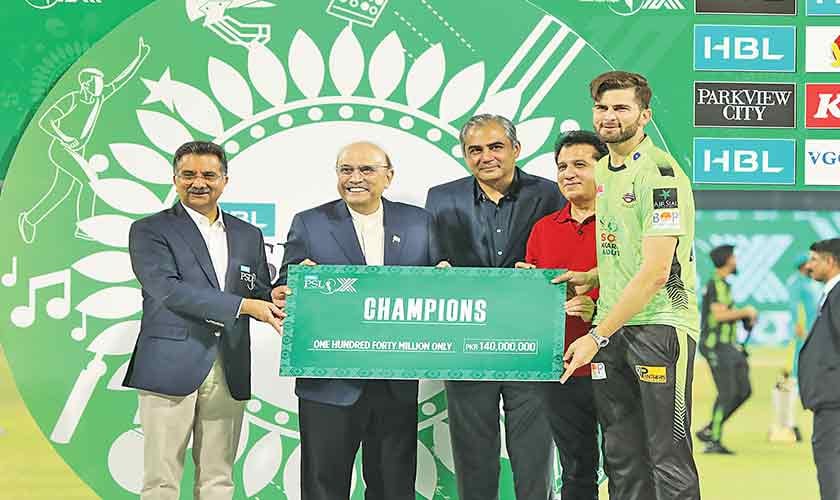My Little Pony and inspiring the next generation: Is the marketing of women’s sport falling short?
What do you picture when you think of women's sport?You might see excited young women holding homemade signs, a family-friendly crowd, or role models on the field creating a better future for women.In a domain that has traditionally excluded women, whether as players, spectators or administrators, women's sport is claiming space.Deloitte predicts that in 2025, sponsors of Australian women's sports teams will see a 75 per cent higher return on every dollar invested compared to sponsors of men's teams.But are elite women's sports selling themselves short when it comes to marketing?Many fans see female athletes as selfless and relatable, but there's a question over whether this devalues their athleticism and competitive edge. (Getty Images: Paul Kane)Role models for the next generationIn a 2024 study, researchers interviewed more than 100 English and American fans who attended the 2019 FIFA Women's World Cup about their perceptions of women footballers as role models.While many fans praised the athletes for their accessibility, selflessness and being relatable, some felt this angle devalued women's athleticism and competitiveness.The researchers worried that this perspective inadvertently puts pressure on women athletes, on top of their day jobs, to motivate the "next generation" who will reap the rewards of professionalisation. They believed this takes the responsibility off those who hold the power to make change to improve conditions now, like clubs, leagues and the media.The research found that this cultural narrative was propelled by athletes, sport organisations and corporate sponsors alike.A 2024 study revealed a narrative that elite women athletes have a responsibility to motivate the next generation. (Getty Images: Elsa/FIFA)In Channel Nine's recent documentary charting the rise of Women's State of Origin, Breakthrough, Australian Rugby League Commission chair Peter V'Landys called women's rugby league players inspirational."I'm proud of what they do in the communities, I'm proud that they juggle jobs, family and playing," he said."We want to use them as much as we can to inspire the future."Jess Richards, a senior lecturer in sports management at Western Sydney University, is concerned about a sole focus on women's sport as inspirational for girls and young women.Women athletes often juggle jobs and family with their sporting careers. (AAP Image: Dave Hunt)"That all comes down to clubs and organisations all over the country improving the fan engagement," Dr Richards said."Female empowerment is very important. But I think sometimes it can actually overshadow the athletic ability of these players … their competitive nature, aggression and those types of things."Media coverage has really highlighted women's sport as primarily this vehicle for social change, and I think that draws attention away from the athleticism of the players."Athleticism isn't often seen as the highlight when it comes to marketing of women's sport. (Getty Images: Quinn Rooney)Critical opportunities to diversify audiencesAusPlay data from 2023 shows more than 600,000 Australians aged 15 and over play netball annually. It's a sport broadly accepted as a fun and social way to keep fit. And while just under 14 per cent of that participation comes from men, it's a fast-growing sector of the sport.The major sponsorship of the elite national netball competition is "Team Girls", a partnership focused on keeping girls playing sport. Demonstrating the positives of team sport, like making friends and learning life skills like resilience, it aims to "support every girl's endgame".Since 2021, Netball Australia has also partnered with toy brand My Little Pony, encouraging children through its junior program NetSetGo to "find their sparkle" and be proud of their individuality.Loading Instagram contentWhile these are meaningful inclusion initiatives, combined they could suggest to adult fans that the professional sport they're following is predominantly for children.Take a passing look at the Matildas' Instagram page and you'll find an emphasis on girls — fans on game day and at training holding signs seeking selfies and match-worn uniforms.You'd be forgiven for forgetting the diverse fanbase the Tillies have developed across Australia, particularly since they hosted the Women's World Cup in 2023.Loading Instagram contentCarleigh Yeomans, a lecturer in sports management at Swinburne University of Technology, says engaging girls in sport is important so they can imagine themselves participating.Numerous studies have shown the high drop-out rates of girls in sport, with some suggesting up to 50 per cent stop playing by the time they turn 17."We want them to get the mental and physical health benefits," Dr Yeomans said."We need to be able to carry them through that 13 to 16-year-old drop in participation so that [their participation] can be sustained."Do you have a story idea about women in sport? Email us abcsport5050@your.abc.net.auThe pros and cons of 'family friendly'The perception of women athletes as role models is reinforced by the ongoing marketing of women's sport as family-friendly."We want to make sure our marketing is highlighting the skill, the competition, the toughness that comes with women's sport just like it does with men's," Dr Yeomans said.ABC Elite Athletes in Australian Women's Sport Survey: We want to hear from you Photo shows A stylised graphic with three silhouettes of unidentified a female footballer, tennis player, basketballer ABC Sport and Deakin University have partnered to produce the first ABC Elite Athletes in Australian Women's Sport Survey.Dr Richards agrees.In 2021, she co-authored a study of the Sydney Sixers Women's Big Bash League games, which found that the contrast in marketing with men's matches contributed to their atmosphere. Men's games were portrayed as a battle between rivals, while women's games were marketed as "cheap and enjoyable family days out."This framing, Dr Richards says, "may inadvertently reinforce stereotypes in a way that [suggests] girls need a softer approach. It subtly implies that they're not suited to competitive, intense environments.""I don't understand why we only just focus on the women's team when we talk about creating safe and inclusive spaces, because every sports game in any code in Australia should be a safe place for people to go and watch sport."It's been argued that being "family friendly" may imply that women's match-ups aren't as competitive or intense as men's. (Getty: Brendon Thorne)Embracing the game playIn April, UK-based broadcaster Sky Sports released a study on women's sport fandom in the United Kingdom. Surveying more than 2,500 fans across age groups and sports, it found that women's sport's dominant audience is actually fans who follow both men's and women's sport, with 80 per cent of UK sports fans interested in at least one of each.According to the report, their fandom is driven by passion for the sport and its skill and achievement — not the gender of who's playing.Yet, only 1 in 2 women's sport fans thought analysis content on women's sport was easy to find, in comparison to more than two-thirds of men's sport fans accessing the same content.Half of fans thought analysis on women's sport was easy to find. (Getty: Graham Denholm)The report concludes that women's sports should deepen their engagement with these existing fans for commercial value by spotlighting individual athletes and their successes, rather than focusing exclusively on attracting new fans or fans of women's sport only.It takes concerted effort to shift away from a dominant narrative, but Dr Richards and Dr Yeomans agree that it comes back to concentrating on game play.Dr Richards points to the Women's State of Origin ads in 2024 that showed the athletes tackling and visibly sweating, in contrast to previous years' marketing."We're still uncomfortable watching women sweat, bleed, and bruise," she says.Women's sport advertising is opening up to the competitive and hard-fought nature of the games. (Getty: Izhar Khan)"I think there's certainly been progress in this space around the way that we market women's sport, [as] not just something that women should have an opportunity to have a try [at]… it is a physical competition."Dr Yeomans was pleased to see Cricket Australia engage women and men in the same marketing campaigns last summer, and highlighted the increase in game play in AFLW promotional material."[They're promoting it as] a contest as opposed to a player standing there and smiling. And I think that's an important transition to make because we want it to be comparable from a competitive landscape."Finally, another starting principle is not to expect everyone of the same gender to like the same things."Women and girls sometimes are still viewed as a homogenous audience, like they're all the same," Dr Yeomans says."We need to get a little more specific about what that target audience is."ABC Sport is partnering with Siren Sport to elevate the coverage of Australian women in sport.Danielle Croci is a policy officer and freelance writer and podcaster specialising in women's sport.















